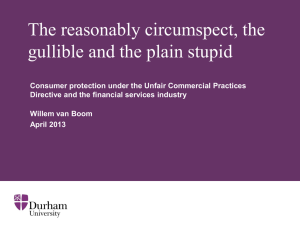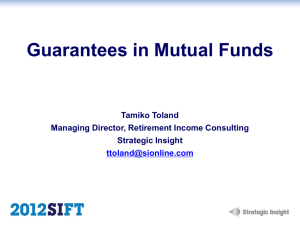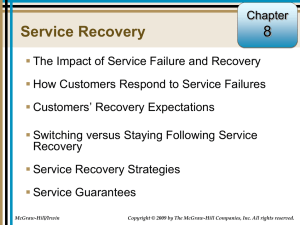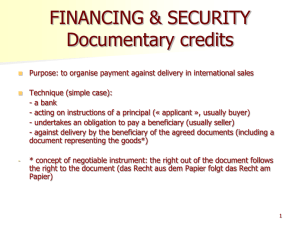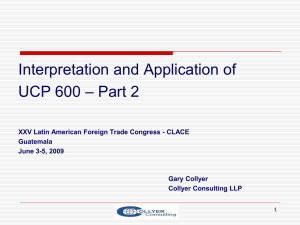UCP 600 – An Overview
advertisement
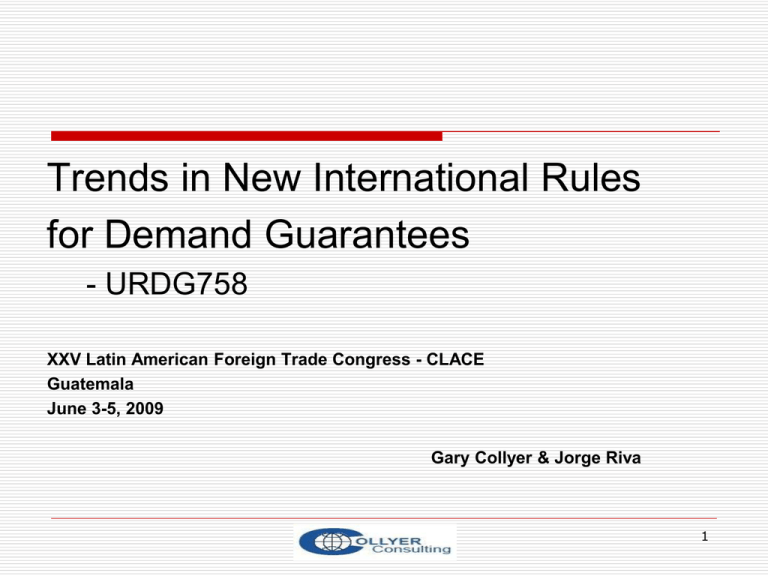
Trends in New International Rules for Demand Guarantees - URDG758 XXV Latin American Foreign Trade Congress - CLACE Guatemala June 3-5, 2009 Gary Collyer & Jorge Riva 1 Guarantees Basic question is: subject to local law, URDG, ISP or UCP? Most common is local law, but a big push for URDG to be accepted. URDG 458 is currently being revised and will be published as URDG 758. ICC Standard texts provided as part of the handouts. These are, obviously, subject to URDG but could be made subject to local law, ISP or UCP depending on the needs of the parties. Commentary to ISP98 being updated to reflect that these rules cover guarantees. 2 Guarantees Whilst a guarantee subject to local law is the most common form of issuance today, are banks really aware of the law that will be applied to the guarantee?? Laws that state that the expiry date of the guarantee is the stated expiry plus up to 30 years! Laws that state that the expiry date of the guarantee is when the original guarantee is returned Laws that state that the expiry date of the guarantee is the stated expiry date plus a grace period of X [days/months] 3 Guarantees Banks issuing counter guarantees that are subject to UCP, ISP or URDG but the guarantee is subject to local law. Is there a mismatch and what if there is a conflict? Requirement for presentation of commercial and/or shipping documents. What level of review is expected of the banks? Is a standby letter of credit the answer rather than a guarantee? Benefits of a standby letter of credit over a guarantee 4 Guarantees Highlights of the proposed changes in URDG 758 Definitions article following the concept in UCP 600 – definitions of advising party (UCP - advising bank), beneficiary, business day (UCP – banking day), complying demand and complying presentation (UCP – complying presentation), presentation and presenter follow those in UCP 600. Interpretations article following the concept in UCP 600 – branches in different countries and irrevocable nature of the guarantee follow the interpretation given in UCP in article 7 5 Guarantees Highlights of the proposed changes in URDG 758 Interpretations article following the concept in UCP 600 – “from, to, until, till and between” and “before and after” plus terms such as “first class, well known, qualified, competent etc.” follow those in the UCP Guarantor deals with documents and not with goods, services or performance to which the documents may relate. Non-documentary conditions – same position as UCP and ICC Opinion TA644 6 Guarantees Highlights of the proposed changes in URDG 758 Content of the instructions to issue a guarantee or amendment must be clear and precise – same position taken in UCP 500 article 5 but not in UCP 600 Concept of a second advising party – same as UCP 600 second advising bank Language of all documents = language of the guarantee 7 Guarantees Highlights of the proposed changes in URDG 758 Advising party satisfying itself as to the apparent authenticity of the guarantee or amendment Amendments follow the concept in article 10 of UCP 600 – cannot be amended without the agreement of all parties, guarantor bound as of the time of issuance, acceptance or rejection in advance or as evidenced by the claim, partial acceptance not allowed and time limits will be disregarded Governing law and jurisdiction articles 8 Guarantees Highlights of the proposed changes in URDG 758 Place for demand – the guarantee must state where it is available and the place for presentation Mode of delivery of a demand – allows for paper or electronic (as is the case under ISP98) Demand for payment must contain within itself or another document an indication of the respect in which the applicant is in breach 9 Guarantees Highlights of the proposed changes in URDG 758 Separateness of the demand – making a non-complying demand does not waive or prejudice the right to make another timely demand. Wrongful rejection does not constitute rejection of any other demand and payment of a non-complying demand does not prejudice the right of the guarantor to refuse subsequent demands (as is the case under ISP98) Partial and multiple demands may be made. Language similar to that in ISP98 10 Guarantees Highlights of the proposed changes in URDG 758 Article covering standard for examination of documents including wording that appears in UCP 600 sub-articles 14 (a) (d), (f), (g), (i) and article 3 in relation to visaed, certified and legalized documents. Five business days to determine if a demand is complying. Period not curtailed or reduced by any upcoming event – similar to UCP 600 sub-article 14 (b) Insertion of language similar to sub-article 15 (a) of UCP 600 11 Guarantees Highlights of the proposed changes in URDG 758 Refusal notices along the lines of UCP 600 article 16 except for the 4 statuses of the documents Disclaimer articles and force majeure article similar in approach to UCP 600 articles 34-37 (no mention of documents lost in transit) Extend or pay provisions included – similar to those in ISP98 Transfer and assignment of proceeds – similar to those in ISP98 12 Trends in New International Rules for Demand Guarantees Thank You Contact : Gary Collyer, Collyer Consulting LLP Email : gary@collyerconsulting.com www.collyerconsulting.com Contact : Jorge Riva Email : jorgeriva@rivaalvarezagudo.com.ar www.rivaalvarezagudo.com.ar 13

